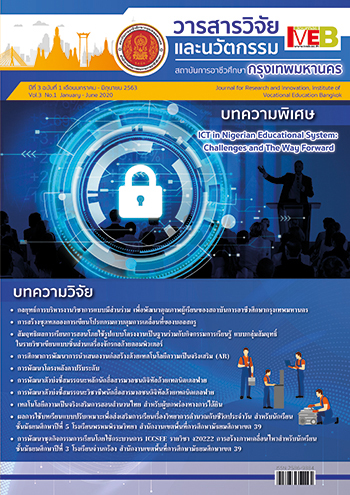ICT in Nigerian Educational System: Challenges and The Way Forward
Main Article Content
บทคัดย่อ
The deployment of Information and Communication Technology (ICT) in education has changed the traditional approach to teaching and learning processes by exposing both teachers and learners to contemporary learning experiences that were not possible before now. The utilization of ICT at all levels of education is unavoidable if individuals are to be adequately equipped for their roles in the modern society. It is when ICT is integrated into education that such education can better prepare learners for lifelong learning. Nations, globally have recognized the potential of ICT in education and have continued to consistently deploy it in their national educational systems for human and societal development. However, most developing countries, including Nigeria have continued to struggle with ICT integration into their educational sector. Despite the key roles and potentials of ICT in education, its utilization in the Nigerian education system has not been encouraging and this has affected the quality of the products from such learning institutions negatively. This paper examines the Nigeria ICT policy, its current implementation in education and factors militating against its effective integration, diffusion and sustainability in education as well as ecommendations to improve its deployment and sustainability in the country’s educational system.
Article Details
เอกสารอ้างอิง
Onwuagboke, B. B. C., Singh, T. K. R. & Fook, F. S. (2015). Need for ICT integration for effective instructional delivery in Nigerian Colleges of Education. Journal of Education and Practice, Vol. 6 No. 3, pp. 51-56.
Ifinedo, P. (2006). Acceptance and Continuance Intention of Web-Based Learning Technologies (WLT) among University Students in a Baltic Country. The Journal of Information Systems in Developing Countries, Vol. 23 No. 6, pp. 1-20.
Sarkar, S. (2012). The role of information and communication technology (ICT) in higher education for the 21st Century. The Science Probe, Vol. 1 No. 1, pp. 30-41.
Twining, P. & Henry, F. (2014). Enhancing ‘ICT teaching’ in English schools: Vital Loisulie, P., & Mselle. L. (2015). Investigating barriers to use ICT as a tool for governance in higher
learning institutions (HLIs). Tanzania. Journal of Informatics and Virtual Education, Vol. 3 No. 1, pp. 35–39.
Olafare, F. O., Adeyanju, L. C. & Fakorede, S. O. A. (2017). Colleges of education lecturers’ attitude towards the use of information and communication technology in Nigeria. Malaysian Online Journal of Educational Sciences Vol. 5 No. 4, pp. 1-12.
Livingstone, S. (2012). Critical reflections on the benefits of ICT in education. Oxford review of education, Vol. 38 No. 1, pp. 9-24.
Albert, C. & Assad, R. (2017). Mobile learning conceptual framework for higher education in developing countries. International Journal of Education and Information Technologies,
Vol. 11, pp. 12-18.
Ololube, N. P. (2013). Evaluating the usage and integration of ITs and ISs in teacher education programs in a sprouting nation. Mediterranean Journal of Social Sciences, Vol. 4 No. 16, 6372.
Yushau, B. & Nannim, F. A. (2018). ICT facilities and their utilization for educational purpose in Nigerian universities: A review of literature from 2004 to 2018. ATBU, Journal of Science,
Technology & Education, Vol. 6 No.1, pp. 237-263


